Space Opera vs Sword & Planet: Flash Gordon
Flash Gordon is sometimes labeled Sword & Planet fiction. It meets quite a few of the characteristics. It has an Earthman, Flash, ending up on a strange world where he engages in battles with strange monsters and weird humanoid aliens, including winged men, bird riders, lion men, and others. However, it fails the S&P test on one major feature, the primary weapon used. When Flash is first challenged, if at all possible, he reaches for a ray gun rather than a sword.
John Carter, Dray Prescot, Jandar of Callisto, and Ruenn Maclang of Talera reach for a sword. For this reason, since “sword” is the very first word in Sword & Planet, I tend to classify the Flash Gordon stories as Space Opera and put them in a category of S&P adjacent. It’s a matter of taste, of course. I tend to be a splitter rather than a lumper, which means I tend to separate genres along narrower lines than some other folks. The images I’ve posted today, downloaded as public domain or as stills from the movie, illustrate this feature of the Flash stories.
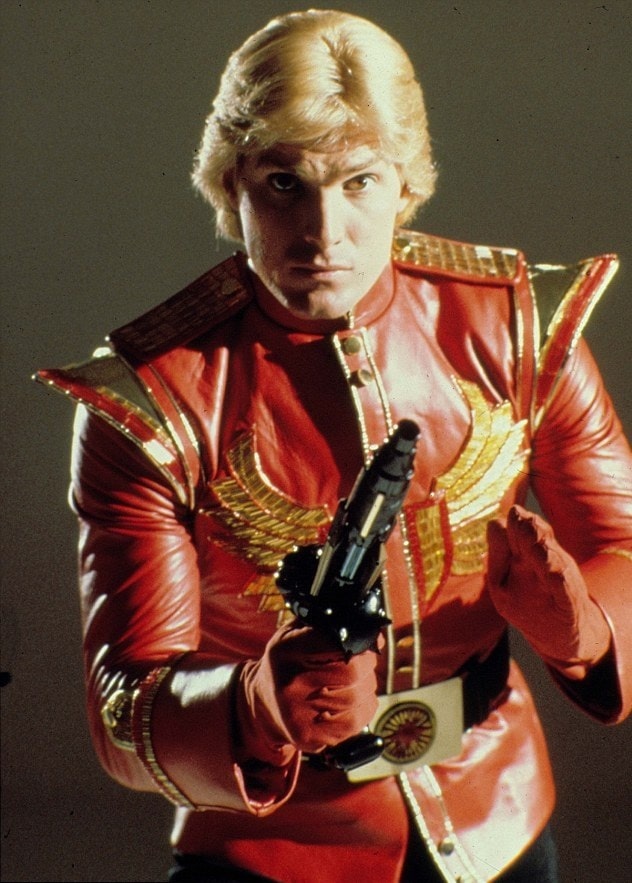
The Flash Gordon stories also have a different kind of origin from works like ERB’s John Carter of Mars tales. They were first developed as a comic strip rather than as serialized prose stories. A Buck Rodgers comic strip had proven popular and Flash Gordon was an attempt to cash in on that same territory. Artist Alex Raymond was given the job of creating the strip, but — as I understand it — did the art and some scripting while writer Don Moore did most of the actual writing.
A novel called When Worlds Collide, which I have and have read, may have inspired the initial set-up of the Flash stories. When a rogue planet is set to crash into Earth, a scientist builds a rocket to help a small group escape to a second world. There’s a heroic athlete aboard, along with his girlfriend, much like the main group in Flash Gordon: Flash, Dale Arden, and Dr. Zarkov. When Worlds Collide was published in 1933 and written by Philip Wylie and Edwin Balmer.
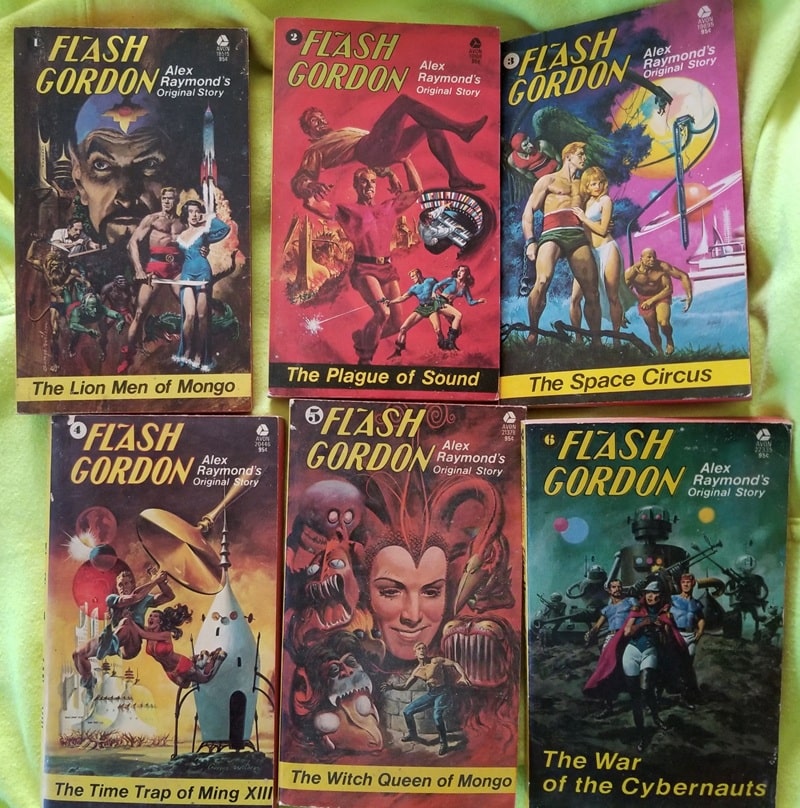
I never read the original Flash Gordon comic strip but have read several of the much later spin-off novels, which I’ve pictured here. And, of course, I saw the movie.
There’s a “campiness” to the movie and most of the books that I don’t see in the S&P work of ERB, or REH, or other S&P authors I’ve talked about, like Carter and Brackett. And that campiness is not an element I’m particularly fond of. Others may differ, of course, and that’s fine.
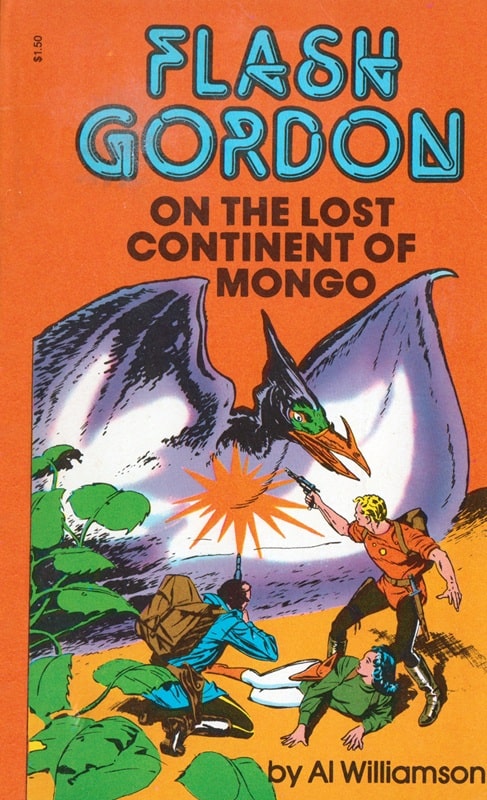 |
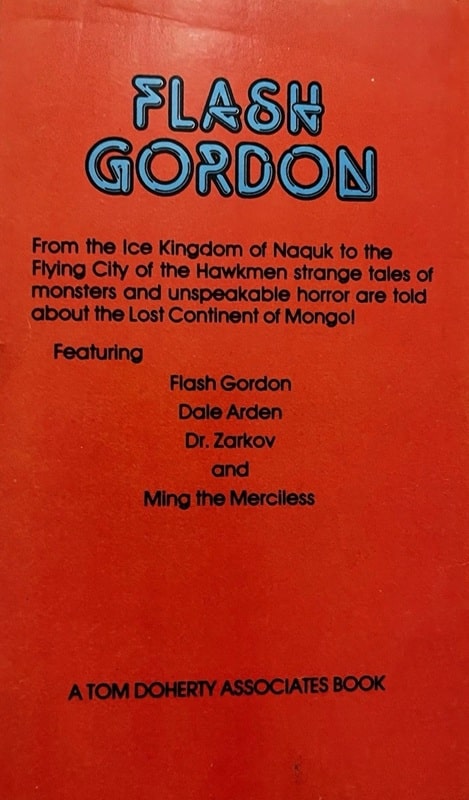 |
Flash Gordon on the Lost Continent of Mongo by Al Williamson
(Pinnacle Books, December 1980). Cover by Al Williamson
I’ll likely talk more about Flash Gordon later but for now, here’s the three books I currently have in my collection.
1. Flash Gordon on the Lost Continent of Mongo: Written and illustrated by Al Williamson (1931 – 2010), a well-known cartoonist who was a fan of Alex Raymond’s original work with the character. A decent enough story, although there are weird gaps in the tale where important events just get left out. This one is closer to S&P than most I’ve read. Likely meant for young readers.
2. Flash Gordon in the Sand World of Mongo: Written by Horace J. Elias. Mostly a prose story with frequent illustrations by an artist I haven’t been able to identify. The writing is fine but there’s almost no action. One swordfight in an arena, but we barely get any description of it. The book seems clearly targeted for kids and Elias also wrote Flintstones and Scooby Do adventures.
3. Flash Gordon: The Plague of Sound, by Con Steffanson, who was really Ron Goulart (1933 – 2022) in this case, I believe. A prose novel and not my cup of tea. I didn’t really care for the style and it’s certainly far removed from S&P fiction in my opinion. Cover artist unknown.
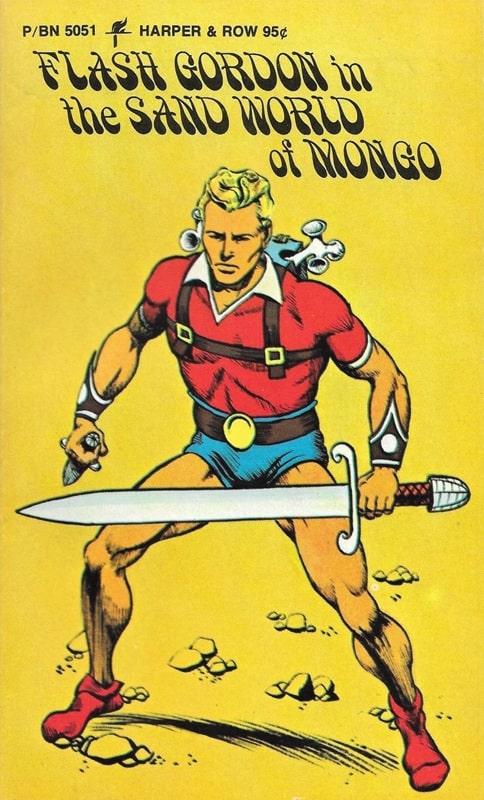 |
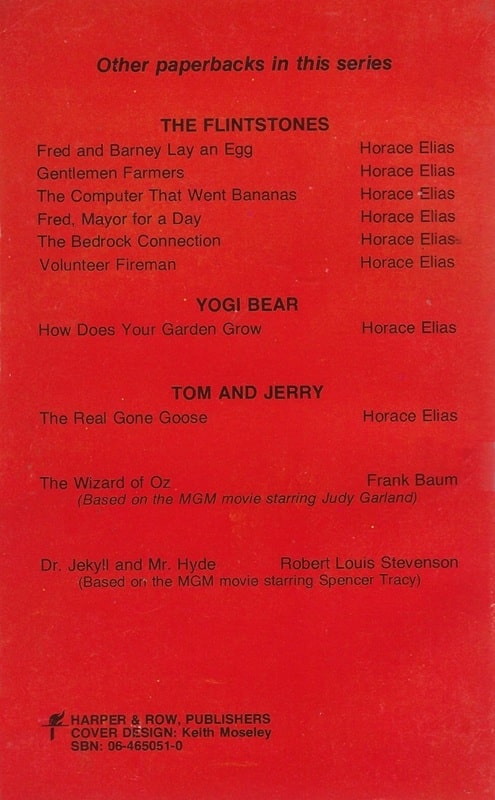 |
Flash Gordon in the Sand World of Mongo by Horace J. Elias
(Harper & Row, 1976). Cover design by Keith Moseley
None of these three particular books fired me up to read more Flash Gordon. If I could find something as compelling as an ERB or a Brackett, I’d be a much bigger fan.
If any of you know about better works featuring the character, tell me.
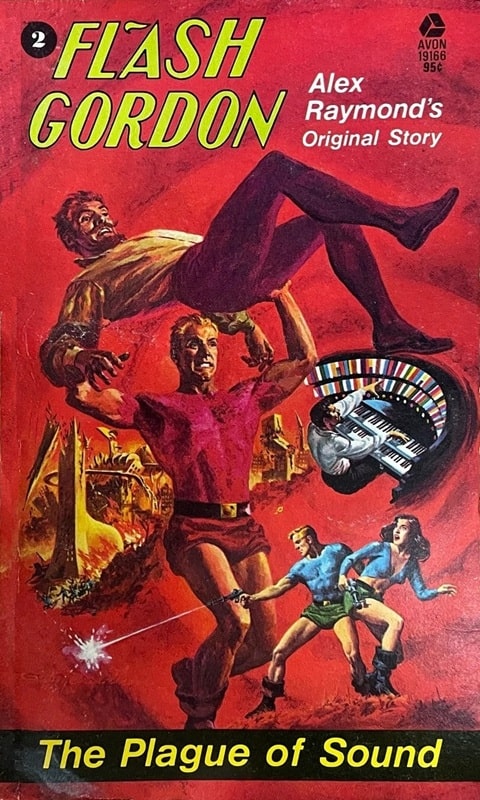 |
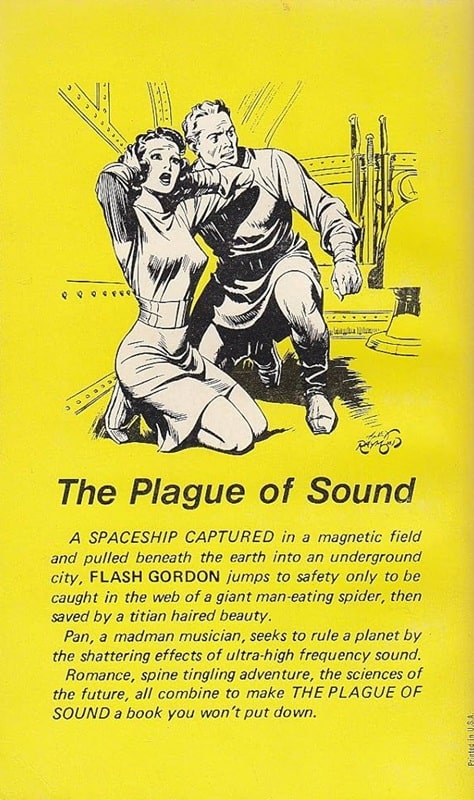 |
Flash Gordon: The Plague of Sound by Ron Goulart, adapted from the
comic by Alex Raymond (Avon Books, May 1974). Cover by George Wilson
Charles Gramlich administers The Swords & Planet League group on Facebook, where this post first appeared. His last article for Black Gate was a look at The Sword & Planet of Leigh Brackett.
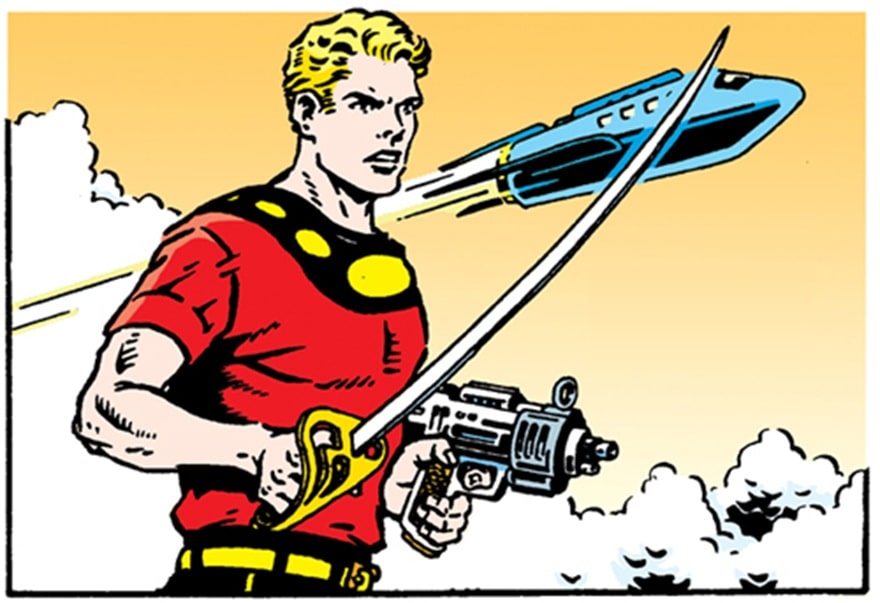
I think you’re missing out on the original run. There is a rawness to it like a band’s first album. I haven’t read much Flash Gordon after it but what I have feels overly polished once the foundation was laid.
It took me reading a good chunk at once to get into it. I was able to get the titan books through my library.
The new Dan Schkade comic strip is a lot of fun too.
I’m gradually expanding my experience with comics and comic strips since I didn’t grow up reading comics and Arkansas newspapers in my area tended not to publish much in the way of SF/fantasy kinds of strips. I never saw Flash Gordon. I’ll have to try a collection of those early strips at some point. You say that Titan has published them?
Titan published the Raymond material in three books but they are out of print.
Madcave has the license now and has published their own versions of the three books with the same titles. Except the production value isn’t as nice as the Titan versions.
Madcave version is on glossier paper and isn’t as close to the newsprint look that Titan pulled off.
thanks for the info
The “essential” Flash Gordon cannot be any prose version, it can only be either the Alex Raymond strip or (my choice) the glorious 1936 serial with Buster Crabbe as Flash and Charles Middleton as the greatest of all screen villains, Ming the Merciless.
I’ll have to try to read the original strip stuff. I’ve never seen any of the Flash serials. I know Buster Crabbe was Flash and enjoyed the episode where he appeared in the Buck Rogers TV show. these days I hardly catch any TV at all except with my wife at supper time and she tends to pick the pieces. We did watch a few episodes of a Flash Gordon animated series here just recently (After this essay was originally written) and they weren’t too bad
I’d recommend finding, on YouTube, Flash Gordon: The Greatest Adventure of All — it’s an animated theatrical film that I believe was partially recycled into the animated series, but it gives a bit more historical context — as the movie opens, Flash is actually trying to escape a Nazi bombing raid in 1939 Warsaw, when he meets Dale and eventually Zarkov and then off they go to Mongo.
(Also, yes, it’s campy and cheesy but I love the de Laurentis movie unreservedly.)
Thanks. I like the film, although my wife is an even bigger fan.
Question: What’s your definition of “space opera?”
I ask, because I agree that Flash Gordon is not S&P, though it is adjacent, but I would never categorize it as space opera. It has always struck me as closer to “space adventure,” like many Heinlein juvenile works and most of the earliest text-based sci-fi computer games. So color me curious about where you draw the genre boundaries.
I agree about its not being space opera. Apart from the cinematic/action-adventure aspect of space opera, it needs to have battles between spaceships. Stories that are set on a planet, or a succession of planets, with travel between planets being just a vehicle, don’t fit.
I agree. In the Encyclopedia of Science Fiction, Clute and Nicholls use a term for any kind of swashbuckling derring-do on alien worlds that I like: Planetary Romance. Both ERB-style stories and Flash Gordon fit nicely into this category.
Yeah, I’ll go with planetary romance as a name. It’s very different from space opera. If I were going to run a space opera campaign, I’d have to design the spaceships, but for planetary romance they’d just be vehicles; all the action would take place planetside. There might not even BE spacecraft: characters might get there through gates, or even by psychic teleportation like John Carter.
Planetary romance is certainly a term that was given to the ERB books pretty early on, but it was also used very generally for a lot of early SF. I like the term Sword & planet for the specific kind of planetary romance that ERB wrote with Barsoom.
Oh, that’s a great term! It definitely fits Flash Gordon.
Yes, I agree, inter-ship battles or the threat thereof needed. With a consistent flavor of wider universe and a hint of person-vs.-politics, even if the narrative remains consistently personal in scope. I think J.B. Rockwell’s “Serengeti” defines the outermost boundary of space opera, in that respect.
In the earliest space opera of Doc Smith we almost always had big space battles and fleets of spaceships, but Edmond Hamilton who can also be put into that early Space Opera often didn’t do that. I just finished reading his Danger Planet for example, part of the Captain Future series, which takes place mostly on one planet and has no big space battles of star fleets. The term for these books at the time was Space adventure rather than space opera. I guess I’m defining space opera as bigger than just the space war kind of stuff.
I think a lot of early SF was just called Space adventure but it seems a little too general to me to categorize how I shelve my own books. I use Space opera to reflect the kind of work that E.E. Doc Smith and Edmond Hamilton did. Although this often had big space battles and space navies (particularly with Smith), it didn’t always have that. In his Captain Future books, Hamilton focused plenty of times primarily on activities on a single planet without any space fleets or space battles. For example, his Danger Planet, written under the Brett Sterling pseudonym, which I just finished reading,. I certainly don’t think Flash Gordon is prototypical space opera but it’s closer to that than to S&P in my opinion, and that’s where I shelve it in my collection. It’s fun to have these kinds of discussions, though
Thanks again for the article, Charles. I have never read any Flash Gordon but I enjoyed the Buster Crabbe serials and the 70s (?) animated show. After reading your comment above, I’ve got to ask – how many books do you have that you categorize them not just as “Sci Fi” but “Sci Fi: S&P”, “Sci Fi: Space Adventure”….And what are the categories? Thanks again.
Jim, I have about 8000 books at home, though not all are on shelves. unread books are boxed or stacked in general categories, like SF/Fantasy, Westerns, Horror/thriller and I’ve got thousands of those. The books I’ve read are in categories organized on my shelves. I have a western section, and then a separate section for Louis L’Amour. I have a separate Star Trek section and a section dedicated to movie/tv tie ins. I have a set of shelves dedicated to SF and one set dedicate to fantasy, and within the fantasy section I have subsections of S&P, S&S, and anthologies. Within the SF section I have anthologies, Military SF, and a general SF section which is mostly Space opera. I have a Koontz/King section on my shelves of thrillers, and a section for pulp fantasy SF, which includes the Spider and Shadow and Doc Savage, and noir pulp, which includes Sallis, Chandler and the like. I like to categorize; reading and collecting and categorizing are my main hobbies.
Completely fair. Thanks for satisfying my curiosity!
thumbs up. I love talking about books
“When Flash is first challenged, if at all possible, he reaches for a ray gun rather than a sword.”
Seems like a missed character beat. As a world-famous polo player, he should have reached for a mallet.
A war mallet. There’s a weapon you don’t see very often. Would have been cool
I forgot to add. In an age long gone by (2010) William Patrick Maynard did a long running Flash Gordon series on this very website.
https://www.blackgate.com/2010/08/27/blogging-alex-raymonds-flash-gordon-part-one-flash-gordon-on-the-planet-mongo/
So he did! You have a very long memory Glenn — that was 15 years and over 12,000 posts ago!
I was regularly reading Black Gate back then but I only remembered this because I did a Flash Gordon deep dive and i stumbled upon his posts in a google search looking for out of print collections.
cool
sweet
cool. thanks for the link. I’ll check it out. I just ordered that collection actually and should have it in a few days. I’m sure I’ll be writing about it in time
Hmm…
Interesting perspective – I’ve always seen Flash Gorden and Buck Rogers as “Sword and Planet” though they do fit better in “Ray-Gun Gothic” or “Ray-Punk” than John Carter. (I loathe the “Punk” neologism) What really causes this is they were pretty new in a brand new genre so the guardrails to either use or make an issue of defying weren’t tacked down good. Scifi/fantasy are IMO held to WAY too high a standard – “Oh, another Alien Invasion…” etc. yeah and if that’s a crime Fabio should be on Death Row for 100+ covers on “Piracy in a Scurvy Age” novels…
As far as the big named classics go even John Carter could be considered “Space Opera” as in later adventures they went to other planets in the solar system – like Sasoom (Jupiter) which had a surface and mean skeleton type men ruling it… But Lensman had blazed through the galaxy long before this.
I think the core might be the theme – kind of like Star Wars contrasted to Star Trek. As far as “Science Fiction” Star Trek is very solid with speculations about technology and its impact, humanity’s future and interaction with tech and exploration + wonder. Star Wars – as science fiction is nuts – a Level 4 effective ancient decadent tech base pretending to be a failing Level 3 civilization populated by sub level 1 (Wild West to Dark Ages) inhabitants. But as a human story, mythic journey, appeal to your feelings and dreams as a universe you might legit want to live in even with the danger and violence.
That might be the difference. Sword and Planet stories are about escapes and second chances – usually a man is alone and drifting (lots of these written in the 30s) and then gets pulled into another dimension or taken to another world. He gets a chance to fight evil and rescue the strangely humanoid alien princess and become a man of reknown vs a drifter trying to survive. Larger such universes are like Star Wars (pre-Disney, the real “Dark Times”) where you have both the freedom of a frontier to high tech cities you can visit full of cool tech toys and usually friendly aliens. By contrast I’m not sure I’d want to live in Star Trek’s Federation normal worlds – it’d be like a sterile, politically correct surface only world it seems though most of the Trek stories are their frontier adventures not their real world. Likewise Buck Rogers and even Flash Gordon have pretty dangerous worlds, one where it’s all wilderness and evil orientals are trying to exterminate westerners in an “Unparalleled Invasion” except whoops they are half alien Asians…and while beautiful Flash Gordon’s “Mongo” is an ancinent and vicious world of oprpession and constant civil war.
part of how one defines the genres may depend on what kinds of things one read at a formative age. For example, when I discovered the Barsoom books and read those, and then Gardner Fox’s Llarn series and a couple of the early Gor novels and some Lin Carter Callisto, I’d never been exposed to any Flash Gordon or Buck Rogers, so they were not available as mind material when I came to establish my personal genre lines. Talking about the “unparalleled invasion,” I’m just now reading an old Operator 5 novel where the “yellow empire” is attacking the west. Someday I’ll have to do a post about how widespread that trope was.
[…] Fiction (Black Gate): Flash Gordon is sometimes labeled Sword & Planet fiction. It meets quite a few of the […]